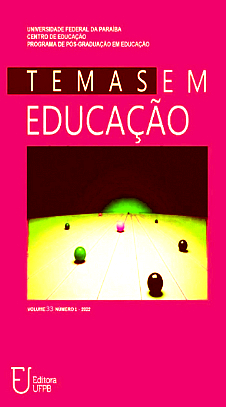Trans*referenciando o currículo:
cartografias desejantes de jovens transvestigêneres
DOI:
https://doi.org/10.22478/ufpb.2359-7003.2024v33n1.68641Keywords:
Currículo Trans*referenciado, Jovens transvestigêneres, Afirmação das diferençasAbstract
This text unfolds based on the following question: what can the curriculum say regarding the presence of transgender young people at school and university? Using a cartographic methodological approach, it maps traces of violence experienced by transgender young people from basic education to higher education, which impedes the right to education. It denounces a policy of extermination of transgender youth, since around 80% of victims of lethal transphobia in Brazil are up to 35 years old. In addition to the violence instituted in the educational field that weakens legal guarantees to protect children and youth, they propose a trans*referenced curriculum as a possibility of thinking about education through affections and encounters, in which images of transgender people can be humanized. To affirm the differences, a trans*referenced curriculum recognizes and values the knowledge and experiences of transgender young people in education.
Downloads
References
ASSOCIAÇÃO NACIONAL DE TRAVESTIS E TRANSEXUAIS-ANTRA. Nota da ANTRA sobre cotas e reservas de vagas em universidades destinadas às pessoas trans. Disponível em: < https://antrabrasil.org/2020/12/17/nota-antra-cotas-universidades-pessoas-trans/ > Acessado em 15/11/2023.
ABRAMOVAY, Miriam (Coord.). Juventudes na escola, sentidos e buscas: Por que frequentam? Brasília-DF: Flacso - Brasil, OEI, MEC, 2015.
BARROS, Laura Pozzana de; KASTRUP, Virgínia. Cartografar é acompanhar processos. PASSOS, Eduardo; KASTRUP, Virgínia; DA ESCÓSSIA, Liliana. Pistas do método da cartografia: Pesquisa-intervenção e produção de subjetividade. Porto Alegre: Sulina, 2009.
BENEVIDES, Bruna G. Dossiê assassinatos e violências contra travestis e transexuais brasileiras em 2022. Brasília, DF: Distrito Drag; ANTRA, 2023.
BENTO, Berenice. Transviad@s: gênero, sexuzalidade e direitos humanos. Salvador: EDUFBA, 2017.
CARRANO, Paulo César Rodrigues. Juventudes e cidades educadoras. Petrópolis: Vozes, 2003.
CORAZZA, Sandra. O que quer um currículo? pesquisas pós-críticas em educação.
Petrópolis, RJ: Vozes, 2001.
DELEUZE, Gillles; GUATTARI, Felix. Mil Platôs: capitalismo e esquizofrenia. Vol. I. São Paulo: Ed. 34, 1995.
NOGUEIRA, S. B. N.; FRANÇA R.; ARAÚJO, M. C. C. A Importância do uso do nome social no exame nacional do ensino médio – ENEM. Revista Geoconexões, v. 2, 2016, p. 21-25.
FREIRE, Paulo. Educação como prática de liberdade. São Paulo: Paz e Terra, 2019.
FREIRE, Paulo. Educação e mudança. Rio de Janeiro: Paz e Terra, 1982.
GALLO, S. Cuidar de si e cuidar do outro. In: W. O. Kohan, & J. Gondra. Foucault
anos. Belo Horizonte: Autêntica, 2006. 177-190.
GROSFOGUEL, R. A estrutura do conhecimento nas universidades ocidentalizadas: racismo/sexismo epistêmico e os quatro genocídios/epistemicídios do longo século XVI. Sociedade e Estado, v. 31 n. 1, 25–49, 2016.
LOURO, Guacira Lopes. O corpo educado: pedagogias da sexualidade. Belo Horizonte: Autêntica, 2018.
PARAÍSO, Marlucy Alves. Currículo, desejo e experiência. Educação e Realidade, v. 34, n. 02, p. 277-293, 2009.
QUIJANO, Aníbal. Colonialidade do poder e classificação social. In: SANTOS, Boaventura de Souza (org.). Epistemologias do sul. (CES), Coimbra: Edições Almedina, 2009.
SILVA, Tomaz Tadeu da. O currículo como fetiche: a poética e a política do texto curricular. 1 ed. 4. reimp. Belo Horizonte: Autêntica Editora, 2010.
Downloads
Published
How to Cite
Issue
Section
License
Copyright (c) 2023 Revista Temas em Educação

This work is licensed under a Creative Commons Attribution 4.0 International License.
Authors who publish in this journal agree to the following terms:
. Authors retain the copyright and grant the journal the right to first publication, with the work simultaneously licensed under the Licença Creative Commons Attribution that allows the sharing of the work with acknowledgment of authorship and initial publication in this magazine. . Authors are authorized to assume additional contracts separately, for non-exclusive distribution of the version of the work published in this journal (eg, publishing in institutional repository or as a book chapter), with acknowledgment of authorship and initial publication in this journal.
. Authors are permitted and encouraged to publish and distribute their work online (eg in institutional repositories or on their personal page) at any point before or during the editorial process, as this can generate productive changes, as well as increase impact and citation of the published work (See O Efeito do Acesso Livre).



















